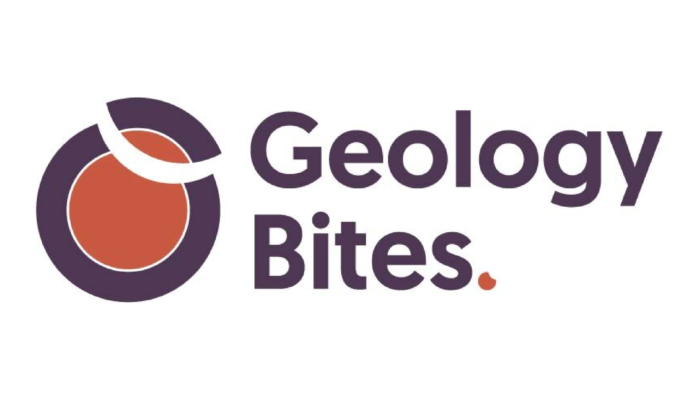
We are still in a lockdown and we can still use some entertainment for when we stare at the same four walls for hours on end or go on our daily walk. Fear not, dear reader, I have got just the thing for you in these troubling times: the new podcast Geology Bites hosted by Oliver Strimpel: www.geologybites.com. Don’t fret about the name, there’s plenty of geodynamics content as well. In this blog post, Oliver Strimpel (former astrophysicist; now keen amateur geologist) highlights 4 episodes of particular interest for geodynamicists and shares a sneak peak of geodynamically-flavoured episodes still to come.
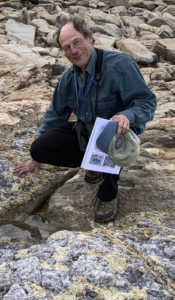 Since you are reading an EGU Blog, you must already know how remarkable the field of geology is. The subject matter stretches the imagination – with its almost cosmological timescales, processes operating on scales from the atomic to the continental, and unimaginable extremes of temperature and pressure.
Since you are reading an EGU Blog, you must already know how remarkable the field of geology is. The subject matter stretches the imagination – with its almost cosmological timescales, processes operating on scales from the atomic to the continental, and unimaginable extremes of temperature and pressure.
But in addition to the intrinsic fascination of the subject, what also makes it remarkable is the ingenuity of its practitioners. The Geology Bites podcast series aims to capture their key ideas and research projects in language that the non-specialist, curious layperson can understand. But while eliminating jargon, I have tried not to sacrifice the essence of the ideas, even when they are quite subtle or complex.
There are episodes on geodynamics, as well as on geophysics, seismology, tectonics, volcanism, paleontology, paleoclimate, mineralogy, geomorphology, and planetary science.
Below are some Geology Bites episodes that might be of particular interest to readers of the EGU Geodynamics blog.
Carolina Lithgow-Bertelloni on Dynamic Topography
Carolina is a Professor of Geosciences at the University of California, Los Angeles. She models the effect of mantle currents on the overriding tectonic plates. The models predict that the mantle can deflect the plates up or down by as much as a kilometer and explain otherwise anomalous topographic features seen both today and in the geological record.
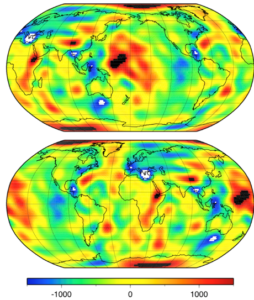
Map of the residual global topography after the isostatic component caused by the thickness and density of the lithosphere is subtracted from the present-day observed topography. The major cause of this topography is thought to be the dynamic topography discussed in the podcast. Prominent high regions (red) are seen under the Western Pacific, the Eastern Africa, Antarctica, and the North Atlantic.
Image courtesy of Carolina Lithgow-Bertelloni.
Laurent Jolivet on the Origin of the Mediterranean
Laurent Jolivet is a Professor at the Institute of Earth Sciences at the Sorbonne University. He is an expert on the motions of the lithosphere and the mantle and has studied the Mediterranean in particular for 30 years. In the podcast he explains topics such as slab rollback and mantle toroidal flow. His animated reconstructions, which are posted on the Geology Bites website, show how the Mediterranean formed as a temporary ocean that will eventually be swallowed up by the collision between Africa and Europe.
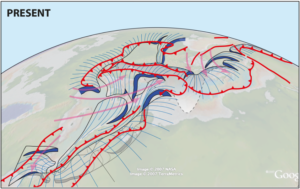
Three-dimensional rendering of the present-day slabs underneath the Mediterranean, showing the main subduction zones (red lines) and mantle flow (pink arrows).
Image courtesy of Laurent Jolivet.
Dan McKenzie on What Venus Tells Us About the Earth
Dan McKenzie is Emeritus Professor of Geophysics, Geodynamics and Tectonics at Cambridge University. Though best known for his discovery of plate tectonics, he has also made fundamental contributions to subjects as varied as how rocks melt and how you can tell where they came from by their isotopic and rare-earth composition; the origin of sedimentary basins like the North Sea and continental margins (with major impact on the oil industry); the gravity field and tectonics of the Earth, Moon, Mars and Venus; the organic geochemistry of hydrocarbons; convection in the Earth’s mantle; mapping the thickness variations of the Earth’s lithosphere with seismic tomography; and the deformation of the continents.
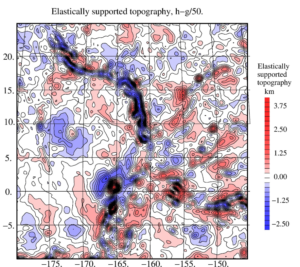
Map of the Atla region of Venus showing the elastic topography, which is the real topography minus the topography caused by convection of the mantle below the surface plate. The map reveals the downward flexing of the plate around the big volcano towards the lower left (around 0, -165) where it elastically supports the extra mass of the volcano. The linear features in this map look like a map of rift valleys in Africa, suggesting that in these regions the plates of Venus and the Earth have similar elastic thicknesses.
Image courtesy of Dan McKenzie.
David Evans on Supercontinents
David Evans is a Professor of Earth and Planetary Sciences at Yale University. He uses paleomagnetism together with uranium-lead dating, to reconstruct the supercontinents that assembled about every 600 million years over most of Earth history. He describes methods he uses in his paleomagnetism lab to tease out original magnetic fields of rocks, even when they have been heavily overprinted or weathered.
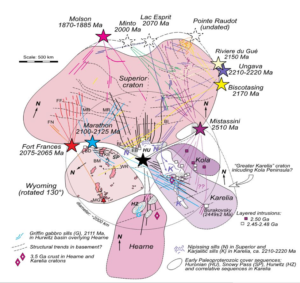
Reconstruction of the Superia supercraton before rifting and breakup of various blocks on its southern margin between 2,500 and 2,080 million years ago. The red star shows the initial location of a hotspot, 2,075 and 2,065 million years ago, and the other colored stars show the inferred location of the hotspot at the indicated time intervals.
Image from Ernst, T., Bleeker, W., Canadian Journal of Earth Sciences, 47, 5, 2010.
The series currently has nearly 30 episodes, and I post new episodes every week or two – whenever they are ready. In the pipeline right now are:
- Sarah Stewart of the University of California Davis on the synestia theory of the origin of the Moon; and
- Gillian Foulger of the University of Durham on the mantle plume debate; and
- Katie Stack, Deputy Project Scientist for the Perseverance rover, on the geological mapping of Mars; and
- Jan Smit, Emeritus Professor at the Vrije Universiteit Amsterdam, on resolving a single hour of the end-Cretaceous cataclysm.
I hope you enjoy the series and do please send me comments and suggestions at geologybitespodcast@gmail.com.
